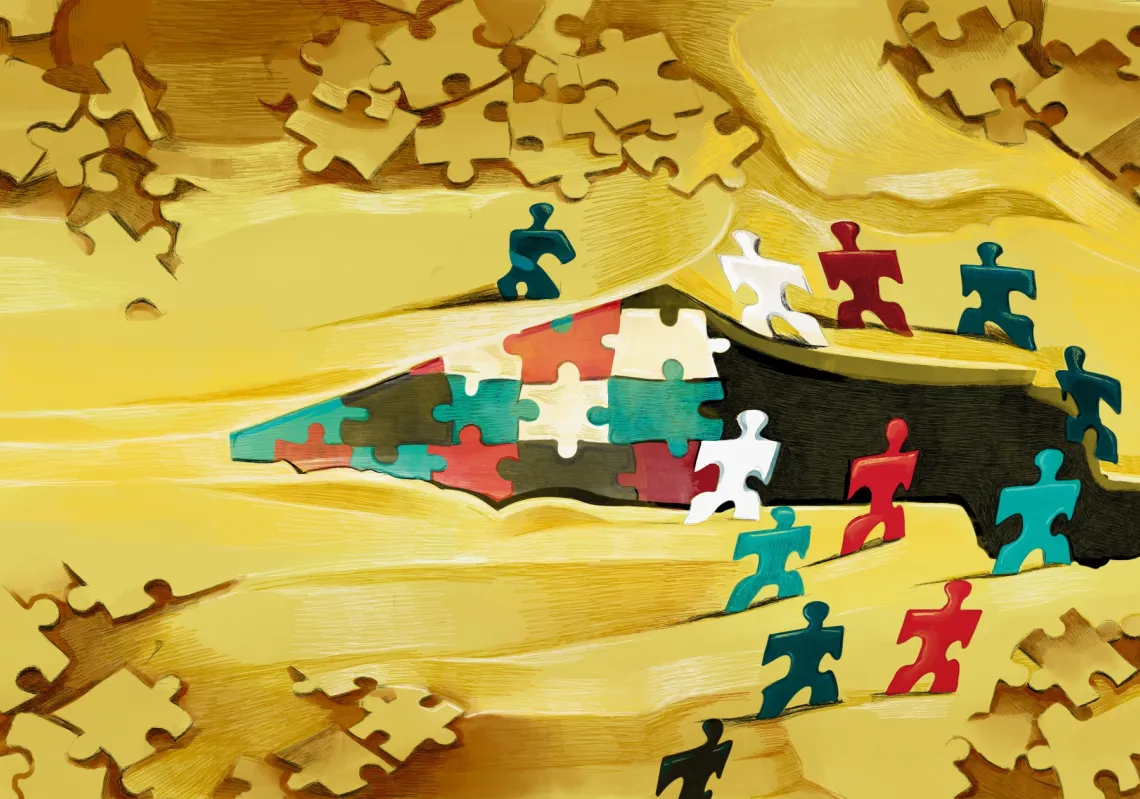Kabul: Wearing headscarves and face masks, young women in black would, until recently, walk towards the entrance of the Kabul University campus where armed Taliban fighters stood guard, watching warily. They could attend classes here every other day, while the remaining days were reserved for men.
When university entrance exams started in early October, many young Afghan women were told that they could no longer sign up for the classes they had hoped for. In some regions, they were barred from studying journalism, while, in others, they were told that engineering was now off limits.
“They want women to only be able to study in the medical, education, and Islamic law fields,” one female political activist told Al Majalla at the time.
“Restricting women to the fields of medical science and education was intended so that they could treat other women in hospitals and clinics and raise children in an Islamic manner,” she said.
“That’s all. They don’t want women to be able to do anything else.”
A few days after a total ban on women attending universities and private educational centres was announced on 20 December, photos circulated online of an Afghan woman outside Kabul University, which she was no longer allowed to enter, defiantly holding up a sign with a single word in Arabic on it: ‘iqra’, the imperative for ‘read’.
IN PICTURE: An Afghan female university student staged the single-woman protest in front of Kabul University & armed Taliban on the gate to condemn Taliban' policy on women's rights to education. Her placard reads a word from #Quran #Iqra which translates :Read: #LetHerLearn pic.twitter.com/SkrdfSXbYg
— Syed Zabiullah Langari (@syed2000) December 28, 2022
According to Islam, this was the first word revealed to Prophet Muhammad by God. Seeking knowledge is considered a duty incumbent upon all Muslims.
Higher Education Minister Nida Mohammad Nadim was quoted by The Guardian as saying that his government would not change its mind on girls’ access to education “even if they drop an atomic bomb on us.”
The Taliban have also recently ordered women to stop working for non-governmental organisations, a move that “will force the UNHCR to temporarily stop critical activities in support of Afghan people, especially women and children,” UN refugee agency head Filippo Grandi said in a statement following the news.

Since the Taliban returned to power in August 2021, public sector schooling for teenage girls has been curtailed beyond Grade 6, although those already enrolled at university had been permitted to continue their education.
Taliban officials have demanded special segregated buildings for women, claiming that conditions are not ripe for girls to study in a proper environment beyond the age of 13.
Such measures, among others, have triggered multiple protests against the Taliban, whose leaders are accused of curbing women’s freedoms throughout Afghanistan.
In late October, photos and videos went viral showing women being beaten at the gates of a university in the northeastern province of Badakhshan.
Multiple protests have been held since then, but media restrictions and concerns that anyone caught recording them could be arrested have resulted in limited available information.
Afghans took to streets in #DC to protest #taliban policies toward women in #Afghanistan. Later they merged with #Iranian protest and marched to the #whitehouse . Some incredible chants by many hundreds of protesters in favor of both neighboring countries #LetAfghanGirlsLearn pic.twitter.com/Y4gLqtFSMh
— Jawaid Kotwal (@KotwalRealtor) January 15, 2023
In Kabul’s private Khatam al-Nabyeen Islamic University, young women in chadors were seen scuttling between classes in late October. It was a sight more common to neighbouring Iran than Afghanistan.
The university was founded in 2007 by a well-known Afghan Shiite cleric, Grand Ayatollah Mohammad Asef Mohseni, who had close ties to the clerical establishment in Iran.
Many saw it as a vehicle to spread Iranian influence in the country.
In 2015, the university administration had allowed the author of this article to speak to some of its women students — a privilege withdrawn in 2022, when we were told that journalists were no longer allowed on campus.
Dwindling opportunities
Former government officials who chose to stay in Kabul after the Islamic Emirate of Afghanistan (IEA) took power last year told Al Majalla that they were frustrated with the steadily dwindling opportunities for their daughters.
One man said that he was sending his daughter to a private art school, which was still open as of late 2022 but which has now been ordered shut down.
Another said his daughter was taking online classes from a teacher who goes to the school building every day and films herself writing on the blackboard but is not allowed to have female students physically in the room with her.
He noted that internet access is now limited and often poor, even in the capital, and so is regular electricity, making internet-based education no longer a viable option for many students.
Al Majalla spoke with people from all walks of life, and none seemed convinced of any valid reason to prevent girls from going to school beyond Grade 6.
Many saw it as part of a long-standing unspoken strategy of the Taliban to make Afghan women invisible, forgotten, and unemployed on account of lack of skill and education, rendering them entirely dependent on male members of their families.














